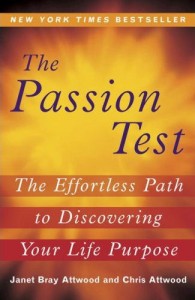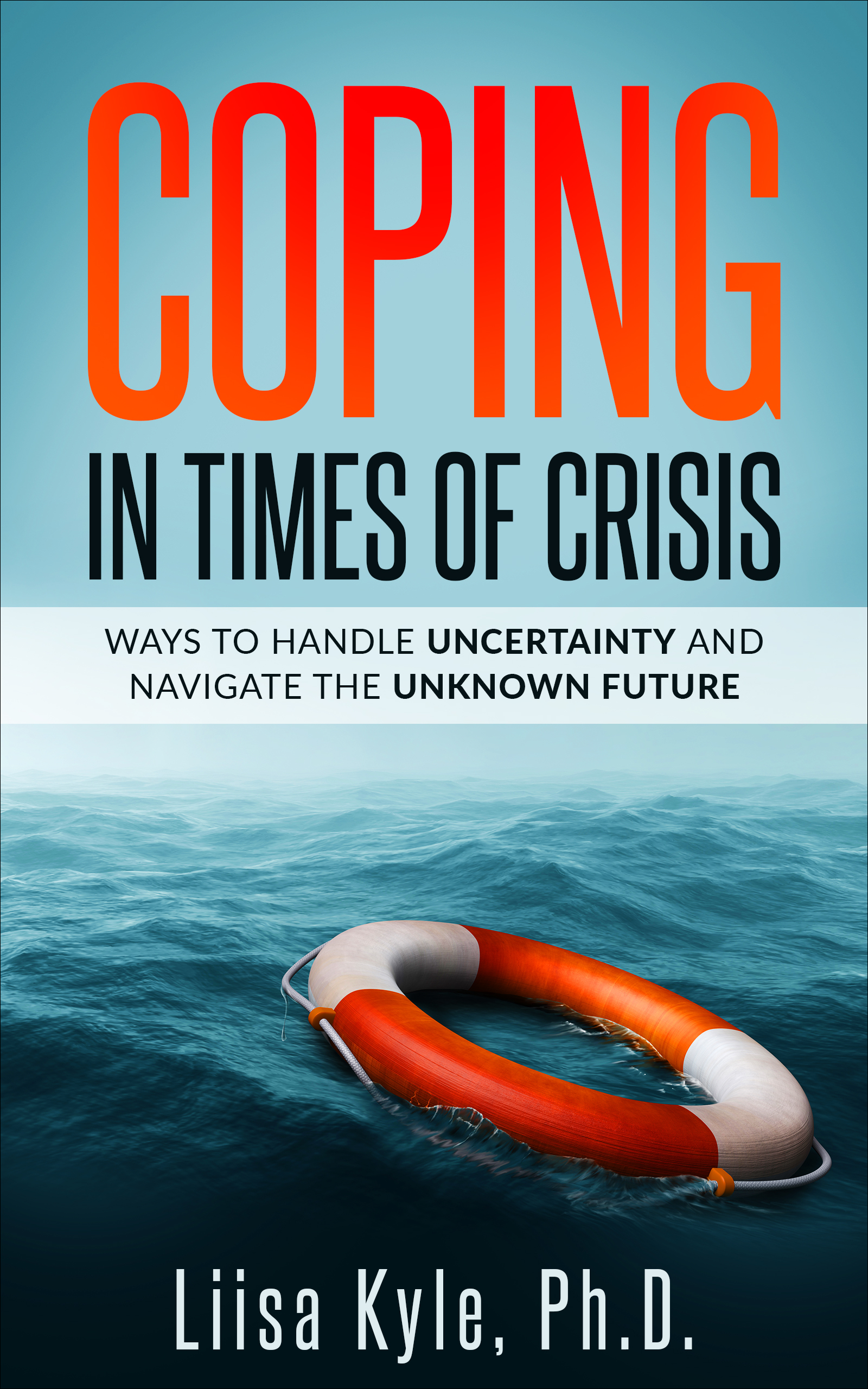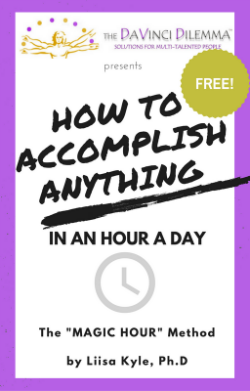 While I read and enjoyed the book The Passion Test when it first came out a few years ago, I had a much closer encounter with it recently when I had the good fortune to be coached in the process by certified Passion Test coach and my good friend Bruce Brown of Quantum Results Coaching.
While I read and enjoyed the book The Passion Test when it first came out a few years ago, I had a much closer encounter with it recently when I had the good fortune to be coached in the process by certified Passion Test coach and my good friend Bruce Brown of Quantum Results Coaching.
The Passion Test is a great tool for people whose passions and interests are somewhat buried or unconscious, and I suspect this is the main audience for whom the book was written. It’s ideal for people looking to discover their talents, or rediscover them. I’m all for anything that helps people figure out, remember or value what they really love.
For DaVincis, though, The Passion Test is more an exercise in subtraction than addition. A lot of us know all too well what our passions are – and there are a awful LOT of them! Whittling them down is a painstaking and painful process. But it’s a useful one. As Bruce says, the ones that don’t make the Top Five are not going anywhere. It’s just good information to know what matters most to you right now, so you can put more of your focus there.
Do what you love. (What is that again?)
At the core of The Passion Test is the notion that our lives are best and happiest when what we are doing matches what we love. It also presupposes that (darn it!) our time and energy are limited, so in order to give our highest desires their due, we need to choose our A-list passions, and the number is limited. Only five. Five?!? My shelves are bursting with books on everything from licensing your own cartoon characters to English Country Dancing to writing song lyrics. I own 67 domain names for all the businesses and product ideas I’m going to develop — someday. How can you expect me to get my list down to only Five Top Passions?
But I did.
Working with a Passion Test coach involves a few meetings, the first of which is preparation and homework, and there is some reading of the book involved. However, the “meat” of the Passion Test process is what I want to share with here, so readers can understand the way the actual test works.
The first step is to come up with a master list of your passions. It’s more powerful to be specific as possible; for example, instead of listing “writing” as a passion, you’d list “Writing for children” or “Writing poetry” or as many as apply. You just keep generating these until you really can’t think of any more. (I think I ended up with 60 or so. Bruce told me that non-DaVincis list around 12! ) They don’t have to be work or talent-related. Some of them might be “being out in natural surroundings” or “enjoying time with my friends.”
Then, with the guidance of your coach or alone, you start making choices in a very specific way. I was taught something similar in my own coaching training where it was called a “forced values” exercise. It’s simple, but it isn’t easy. You just take the first item on the list and compare it to the second. Then ask yourself, if, of these two things, you could only have one in your life, which would you choose? Then you take the “winner” and compare it to the third thing on the list, and so on. Once you’ve made it through the whole list, the “winner” is the first of your Top Five Passion. Then you go through the whole thing again with the items that are left, and repeat the process until you have five.
You then use them each to complete the sentence, “My life is perfect and I am___”
“My life is perfect and I am writing a comedy screenplay.”
“My life is perfect and I am working with brilliant creative people.”
“My life is perfect and I am illustrating books for children.”
Etc.
And you end it all with “This, or something better!” Just in case you’ve been thinking too small and the Universe decides to hand you the passion jackpot.
How DaVincis Can Get the Most out of the Passion Test:
Know you can take it more than once. Many DaVinci types may be reluctant to identify their top five passions for fear they’ll be “stuck” with them forever. Rest assured that it’s totally OK to retake the test whenever your values change. Obviously, it would probably be counterproductive to take it every day, but you might revisit it once a quarter, or once every six months. Or, rather than setting a time, you can decide to take it anytime you have that uneasy feeling that the life you are living is not in line with what you care about most.
Keep your Master List. Don’t look at it much; that will make you crazy. But knowing that everything you listed is still there is a comfort. Also, it’s fun when you look back months later after taking the test again to see what mattered to you back then. (You were mad for hula after your trip to Hawaii, but now it’s not such a burning desire.) And it’s instructive to see what items make your list every time.
Make multiples of your Passion Card and stick them everywhere. Pre-empt DaVinciesque distraction and tangents. If the test worked for you and you really like the list you came up with, make sure you put it where you can see it often. Pad-size Post-its are great for this. You can always choose to focus on something else, but at least give yourself a fighting chance to pick or stick with an activity that really matters to you. Also, looking at your Passion Card often will get your mind sensitized to look for opportunities to use your passions, perhaps in new and surprising ways.
Use your Passions to make smart choices daily. As a DaVinci, we want to do it all, and others make lots of requests that make use of our talents. We love saying yes, but if making decorations for your neighbor’s PTA bake sale or singing at the wedding of someone who isn’t your sister or your best friend isn’t in line with your passions, politely decline. Or, if it is, you can bring a little extra gusto to the activity.
Activity: Start a master list of your passions. Go someplace quiet with no distractions where you won’t be interrupted and list absolutely everything you love. ( I used a special notebook for this so I could add to it later, and also record any thoughts.) Then, either try a DIY version of The Passion Test as described above, pick up the book as a guide, or talk to a PT coach like Bruce Brown. And you can always enlist the support of a DaVinci Coach to help you discover and prioritize your talents and passions.
Have you done The Passion Test? How do you choose and prioritize what you love most? Is it a challenge? Please share your thoughts!
*****
If you’d like to share or publish this article, you may, if you include the author’s name, a link to this original post and the following text blurb:
Are you struggling with too many talents, skills, ideas? You may have The Da Vinci Dilemma™! Find tools, fun quizzes, coaching, inspiration and solutions for multi-talented people at http://www.davincidilemma.com/.




Wow, Lisa, what spot-on recapture of The Passion Test experience! Thank you for writing this post to share the benefits of discovering, ordering, and living in alignment with one’s passions. And thanks for the plug, too!
I can speak personally about the benefits I’ve received from taking The Passion Test – which I’ve now done many times now but originally way back in early 2009! To set some context: My first experience with personal development tools and training was in the Spring of 1973 when Marge and I took a two-weekend workshop called Adventures in Attitudes. Since then we’ve been students of personal development. I’ve been to oodles of seminars and weekends and read lots of books, listened to tapes, lectures, and CDs and watch DVDs of workshops of material. I’ve been a counselor, coach, and consultant in several fields and also was a practicing therapist for several years. Over all those years of study, personal application of what I learned (or better said, “came to understand”), and professional use of personal development concepts and tools, nothing else has been so effective as The Passion Test. I’m not implying The Passion Test is the be-all personal development tool, but that in my experience you get more “bang-for-the-buck” from taking The Passion Test (the free versions, from the book, in workshops, or with a coach) than any other single personal development experience. (Well, maybe except for Divine Intervention!)
The major benefit our clients have reported, and the one we hear most often, is clarity in making life decisions. I’m not a DaVinci, but even with my shorter list of interests and my own susceptibility to BSOS (Bright Shiny Object Syndrome), making choices and decisions can be confusing and difficult, certainly tiring, and potentially another whole distraction as the decision process takes on a life of its own! Now, and this is largely because I have burned in my list of top 5 passions, it’s much easier for me to decide or choose – super helpful as I react to the many opportunities that life provides. So clarity is a huge benefit to taking The Passion Test and for me, a major time saver. (Parenthetically, it can also be a nice way to turn someone down, “Well, thanks for the opportunity, but I’m consciously deciding in favor of my top passions these days and, while I can appreciate and am attracted to your ((whatever)), my strongest passions lead me in another direction.”)
The other point I wanted to make (and for those who are still with me, thanks, because this is the most important) is that discovering and ordering your passions involves both head and heart to different degrees in different parts of the process. Creative and intuitive folk may find it easier than analysts and controller types to prioritize passions, because doing it isn’t about facts and scores and rank-weighting and all that. When you prioritize your passions you must follow your heart. Since the brain is the organ we use to process the input during this prioritization (even input from our heart), DIY can be cumbersome at best and sometimes even impossible for those who can’t get out of their heads. Put it this way, your heart “knows” and instantly “recognizes” your passions, and has little trouble deciding between them – your head, however, can make the process endless with questions and analysis. The part of The Passion Test process when most people can benefit from working with another person who can pick up what your heart knows, wants, and needs is during prioritization. Think of it like this: when your destiny is calling, it helps to have an operator and interpreter on the line to be sure you understand the message.
Once again, Lisa, thanks for the post and the help in spreading the benefit of The Passion Test.
Bruce Brown
QuantumResultsCoaching.com
BeingBruceBrown.com
Bruce@QuantumResultsCoaching.com
Twitter: brucebrownnc
@Bruce, I was doing ok with your statements until the last, “most important” paragraph.
You differentiate between the “heart” and the “brain” and identify them to be in conflict when choosing passions. I’m pretty sure that scientists have determined that the heart is an organ that pumps blood and has no “feelings” itself.
Are you attempting align the emotional parts of the mind with the “heart” or do you believe that the heart holds your emotions?
If the former is the case, I think you’re trying to tell me that my emotions already know what makes me happy. Stands to reason. Happiness is an emotion.
If it’s the latter, your entire comment just fell off the crazy cliff.